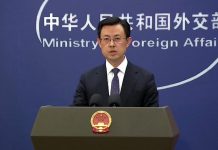
Thailand’s coalition parties on Thursday Aug 15 announced their support for Paetongtarn Shinawatra, daughter of former Prime Minister Thaksin Shinawatra as the country’s 31st prime minister on Tuesday, a day before a parliamentary vote to select the new leader.
The Pheu Thai Party, the largest in the coalition, officially nominated Paetongtarn for the premiership. Coalition partners expressed their readiness to vote unanimously for her, citing confidence in her knowledge and abilities.
Paetongtarn thanked the coalition parties for their support, expressing confidence in their collective ability to lead Thailand out of its economic crisis.
The parliamentary vote for the new prime minister is scheduled for Wednesday. If elected, Paetongtarn would become Thailand’s 31st prime minister and the second woman and the youngest person ever to hold the office, succeeding Srettha Thavisin, whose term was cut short by the court ruling. The Constitutional Court ruled Wednesday that Srettha had breached ethics rules by appointing a lawyer once convicted to the Cabinet in April.
The Pheu Thai Party, with a strong coalition of 314 votes, has reaffirmed its commitment to not pursuing amendments to Section 112 of the Criminal Code or the royal defamation law.
O-ran Thinbangtiao, a political scientist from Burapha University, assesses Paetongtarn’s potential as Prime Minister. He believes the candidate is well-prepared, with strong political backing and a popular appeal centered on soft power policies. However, the political landscape may present significant challenges, and the long-term stability of her government is uncertain.
Pichai Rattanadilok Na Phuket, Director of the Political and Development Strategy Program at the National Institute of Development Administration (NIDA), pointed out that Paetongtarn could increase the popularity of the Pheu Thai Party if she can effectively implement policies that reach the people. However, if she fails to do so, the party’s popularity could decline.
Moreover, she might become a target and face political resistance, risking the same fate as former Pheu Thai Prime Ministers. Additionally, due to her lack of experience, she may encounter challenges in governing the country, said Pichai.
Should Paetongtarn be elected, the formation of a new cabinet will commence. While the coalition partners are expected to maintain their current quotas, minor adjustments could occur. The new Pheu Thai-led government will inherit pressing economic challenges and must clarify the future of the Digital Wallet project. (TNA)








